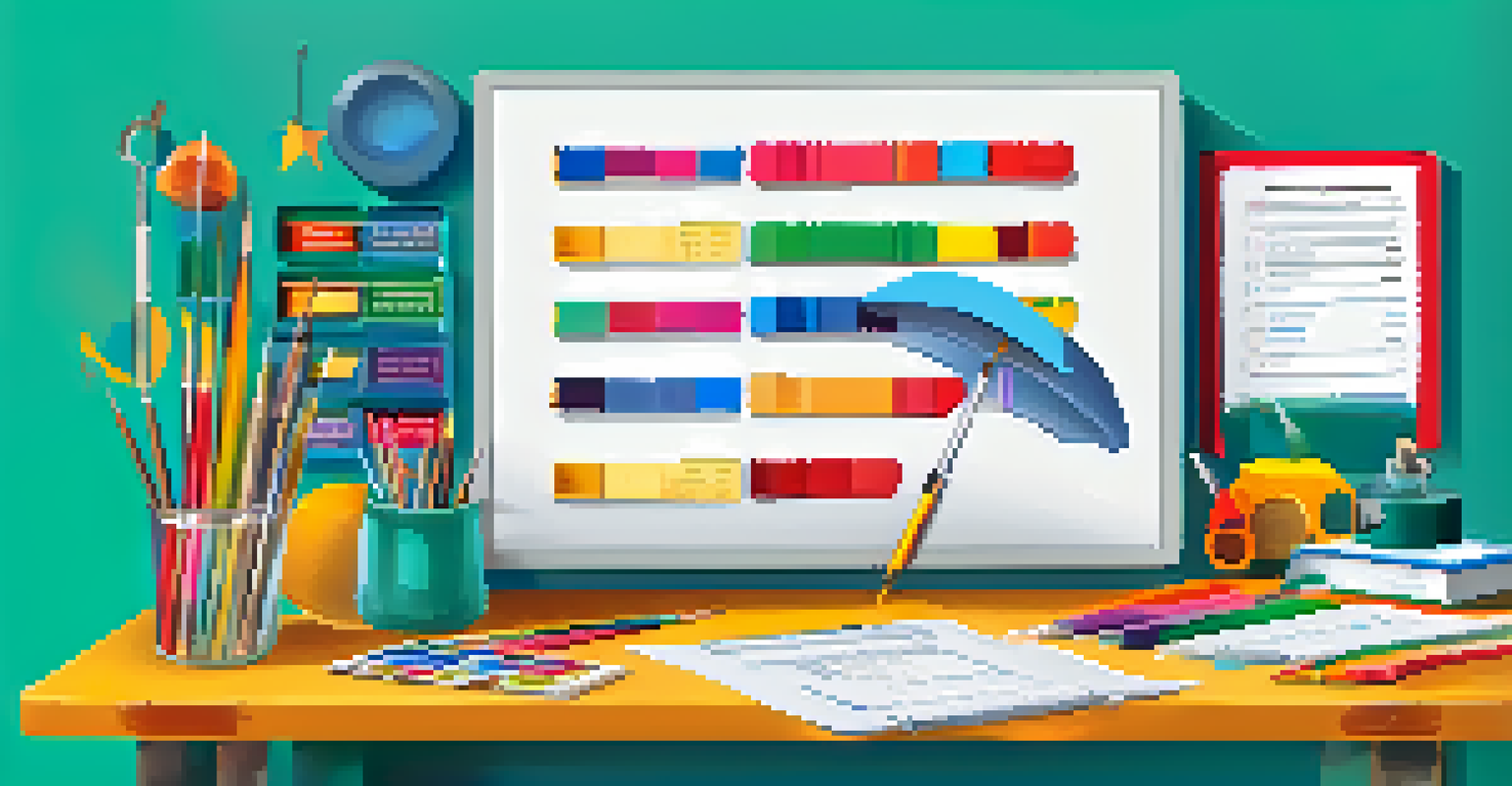Self-Assessment Tools: Which Ones Work Best for You?

Understanding Self-Assessment Tools and Their Importance
Self-assessment tools are instruments designed to help individuals evaluate their skills, strengths, and areas for improvement. Think of them as mirrors reflecting not just your current abilities but also your potential. In an ever-evolving world, knowing where you stand can empower you to pursue targeted personal and professional growth.
Knowing yourself is the beginning of all wisdom.
These tools can range from personality tests to skills assessments, offering insights that can guide your career choices, educational pursuits, or even personal relationships. For example, a personality assessment might reveal that you thrive in collaborative environments, which can influence your job search or team dynamics.
Ultimately, using self-assessment tools can help you make informed decisions about your future. By understanding your unique traits and preferences, you can create a roadmap that aligns with your goals, leading to a more fulfilling life.
Types of Self-Assessment Tools Available Today
There are various self-assessment tools available, catering to different needs and preferences. Some popular types include personality tests like the Myers-Briggs Type Indicator, skills assessments, and emotional intelligence quizzes. Each tool serves a unique purpose, providing valuable insights into different aspects of your character or capabilities.

For instance, personality tests can help you understand how you interact with others, while skills assessments can highlight specific competencies that may require further development. This variety allows you to choose tools that resonate with your personal development objectives.
Self-Assessment Tools Empower Growth
These tools help individuals evaluate their skills and set targeted personal and professional development goals.
In today’s digital age, many of these tools are accessible online, often free or at a low cost. This convenience makes it easier than ever to explore your strengths and weaknesses at your own pace.
Popular Tools: Myers-Briggs Type Indicator Explained
The Myers-Briggs Type Indicator (MBTI) is one of the most recognized personality assessments. It categorizes individuals into 16 distinct personality types based on four dichotomies: introversion/extroversion, sensing/intuition, thinking/feeling, and judging/perceiving. Each type provides insights into how you process information and interact with the world around you.
The greatest discovery of my generation is that a human being can alter his life by altering his attitudes.
Using the MBTI can help you identify your natural tendencies, which can be particularly beneficial in team settings. For example, knowing that you are an extroverted thinker might encourage you to take on leadership roles where your strengths can shine.
However, it's important to remember that while the MBTI can offer valuable insights, it’s not a definitive measure of your capabilities. It's merely a tool that can help you understand yourself better, ultimately guiding you toward environments where you can thrive.
Emotional Intelligence Assessments: Why They Matter
Emotional intelligence (EI) assessments evaluate your ability to recognize and manage your emotions and those of others. High emotional intelligence is often linked with effective communication, empathy, and conflict resolution skills, making it a crucial asset in both personal and professional settings.
For example, knowing how to navigate your own emotions can help you respond rather than react in stressful situations. This skillset is particularly valuable in leadership roles, where understanding team dynamics can enhance collaboration and morale.
Diverse Tools Cater to Personal Needs
Various self-assessment tools, like personality and skills assessments, provide tailored insights for individual growth.
By engaging with EI assessments, you can identify areas for improvement, such as emotional regulation or empathy. This self-awareness can lead to more meaningful interactions and better relationships in your life.
Skills Assessments: Pinpointing Areas for Development
Skills assessments are designed to measure specific competencies related to your career or personal goals. These tools can help you identify both your strengths and the skills that may need further enhancement. For instance, a technical skills assessment might reveal that you excel in coding but need to improve your project management abilities.
This clarity can be instrumental when planning your career path or seeking additional training. By pinpointing what you need to work on, you can create a more tailored professional development plan that aligns with your aspirations.
Moreover, many skills assessments offer benchmarks, allowing you to compare your abilities with industry standards. This information can be invaluable in understanding where you stand in your field and identifying opportunities for growth.
Choosing the Right Self-Assessment Tool for You
With so many self-assessment tools available, how do you choose the right one? Start by considering your goals. Are you looking to improve your interpersonal skills, understand your career preferences, or develop specific competencies? Identifying your primary objectives will help narrow down your options.
Additionally, think about the format you prefer. Some people might find online quizzes more engaging, while others may prefer structured questionnaires or in-person assessments. Choose a tool that fits your learning style and comfort level.
Interpreting Results for Improvement
Reflecting on and discussing assessment results can deepen self-awareness and guide positive changes in life.
Finally, don’t hesitate to combine multiple tools for a comprehensive view of yourself. Just as a puzzle comes together with various pieces, using different assessments can provide a fuller picture of your personality and skills.
Interpreting Your Results: Making Sense of Insights
Once you’ve completed a self-assessment tool, interpreting the results is key to leveraging the insights effectively. Take time to reflect on what the results mean for you and how they align with your experiences. For example, if a personality test indicates you are a strong collaborator, think about past situations where you excelled in team settings.
It's also helpful to discuss your results with trusted friends, family, or mentors. They can offer additional perspectives and help you see aspects of yourself that you might overlook. This collaborative approach can lead to deeper understanding and growth.

Remember, the goal of self-assessment is not to label yourself but to foster awareness that can lead to positive change. Use the insights gained as a foundation for your personal and professional development journey.